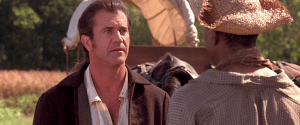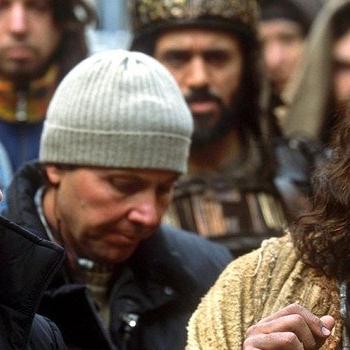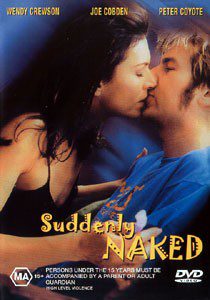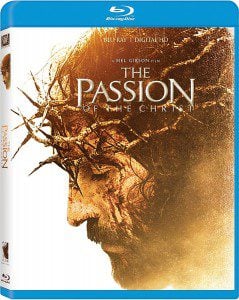 The Patriot pretends to be an historical epic, but it is, in truth, a B-grade revenge thriller. Despite the versatile, charismatic presence of Mel Gibson — who was paid a record $25 million to star in this film — there is no getting around the utterly formulaic script (by Saving Private Ryan’s Robert Rodat) and the stodgy direction (by Roland Emmerich, whose credits include more honestly junky films like Independence Day and Godzilla).
The Patriot pretends to be an historical epic, but it is, in truth, a B-grade revenge thriller. Despite the versatile, charismatic presence of Mel Gibson — who was paid a record $25 million to star in this film — there is no getting around the utterly formulaic script (by Saving Private Ryan’s Robert Rodat) and the stodgy direction (by Roland Emmerich, whose credits include more honestly junky films like Independence Day and Godzilla).
It’s obvious how every scene in this slow-moving Revolutionary War epic is going to end from the moment it begins. Gibson plays Benjamin Martin, a former war hero who, like the commandos and car thieves of many a potboiler, has left his old life behind but is constantly reminded that he was one of the best. Naturally, a crisis forces him out of retirement and plunges him into the conflict, along with many of his old comrades.
The film does have its moments. Early on, there are some promising debates on tyranny within and without democracy, and in one eerie scene, Benjamin, a widower with seven children, watches as a battle spills over onto his South Carolina property; one of the wounded turns out to be Benjamin’s son Gabriel (Heath Ledger, the Aussie love interest in 10 Things I Hate about You), who has joined the revolution against his father’s wishes.
Benjamin tends to the soldiers, Brits and Americans alike, but his efforts go unappreciated by Col. Tavington (Jason Isaacs), the latest in a long line of sneering British villains, who arrests Gabriel and kills one of Benjamin’s other children. In a sequence that already has gun lobbyists cheering, Benjamin, dropping his pacifism, and two of his preteen sons run into the woods and ambush the soldiers who are carrying Gabriel away.
Benjamin goes on to lead a militia that works from a secret base in a dark swamp. Benjamin, known to his on-screen opponents as “The Ghost”, was actually modelled on Francis Marion, a fighter known as “The Swamp Fox” who, in the words of Christopher Hibbert, “hunted Indians for sport and regularly raped his female slaves.” Traces of Marion’s history do remain — the film alludes to “sins” which Benjamin committed in his past, and for which he still feels terrible remorse — but otherwise, the character has been whitewashed.
Unlike Marion (and Washington and Jefferson, for that matter), this revolutionary hero doesn’t own any slaves. When the black people working his farm finally get some dialogue, it is to tell the British that they are free men working for Benjamin of their own free will. A slave is introduced to the story later on, but he has nothing interesting to do or say, except count the days to his emancipation (slaves who fought the British for twelve months were granted their freedom).
The dialogue is full of banalities, some of which are downright anachronistic. (“May I sit here?” Martin asks his lady-love sister-in-law, played by Joely Richardson. “It’s a free country,” she replies, “or at least, it will be.”) For all this film’s stuffy seriousness, every bullet wound and tomahawk to the head is treated like a popcorn-movie thrill. And many plot twists — from the lover who is murdered in the film’s third act to the bad guy who talks too much and gives the hero a chance to strike back — feel like they were borrowed from a cheap action flick.
The one thing that almost saves the film is Gibson, who is equally at ease in scenes that require him to be serious, funny, romantic, or just plain heroic. I’m not sure if it counts as a complex performance, or if Gibson simply knew how to change his moods to suit the scene. But it’s almost enough to make you overlook the film’s flag-waving politics, as well as odd little details like the fact that Benjamin’s children never seem to age, even though the story covers several years of American history.
2 stars out of 5
— A version of this review was first published in The Vancouver Courier.












